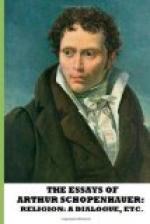precisely the one which is not protected by the State;
still, there is a saying in China, universally acknowledged,
and of daily application, that “the three faiths
are only one,”—that is to say, they
agree in essentials. The Emperor confesses all
three together at the same time. And Europe is
the union of Christian States: Christianity is
the basis of every one of the members, and the common
bond of all. Hence Turkey, though geographically
in Europe, is not properly to be reckoned as belonging
to it. In the same way, the European princes
hold their place “by the grace of God:”
and the Pope is the vicegerent of God. Accordingly,
as his throne was the highest, he used to wish all
thrones to be regarded as held in fee from him.
In the same way, too, Archbishops and Bishops, as such,
possessed temporal power; and in England they still
have seats and votes in the Upper House. Protestant
princes, as such, are heads of their churches:
in England, a few years ago, this was a girl eighteen
years old. By the revolt from the Pope, the Reformation
shattered the European fabric, and in a special degree
dissolved the true unity of Germany by destroying
its common religious faith. This union, which
had practically come to an end, had, accordingly,
to be restored later on by artificial and purely political
means. You see, then, how closely connected a
common faith is with the social order and the constitution
of every State. Faith is everywhere the support
of the laws and the constitution, the foundation,
therefore, of the social fabric, which could hardly
hold together at all if religion did not lend weight
to the authority of government and the dignity of
the ruler.
Philalethes. Oh, yes, princes use God
as a kind of bogey to frighten grown-up children to
bed with, if nothing else avails: that’s
why they attach so much importance to the Deity.
Very well. Let me, in passing, recommend our
rulers to give their serious attention, regularly twice
every year, to the fifteenth chapter of the First Book
of Samuel, that they may be constantly reminded of
what it means to prop the throne on the altar.
Besides, since the stake, that ultima ration theologorum,
has gone out of fashion, this method of government
has lost its efficacy. For, as you know, religions
are like glow-worms; they shine only when it is dark.
A certain amount of general ignorance is the condition
of all religions, the element in which alone they can
exist. And as soon as astronomy, natural science,
geology, history, the knowledge of countries and peoples
have spread their light broadcast, and philosophy
finally is permitted to say a word, every faith founded
on miracles and revelation must disappear; and philosophy
takes its place. In Europe the day of knowledge
and science dawned towards the end of the fifteenth
century with the appearance of the Renaissance Platonists:
its sun rose higher in the sixteenth and seventeenth
centuries so rich in results, and scattered the mists




